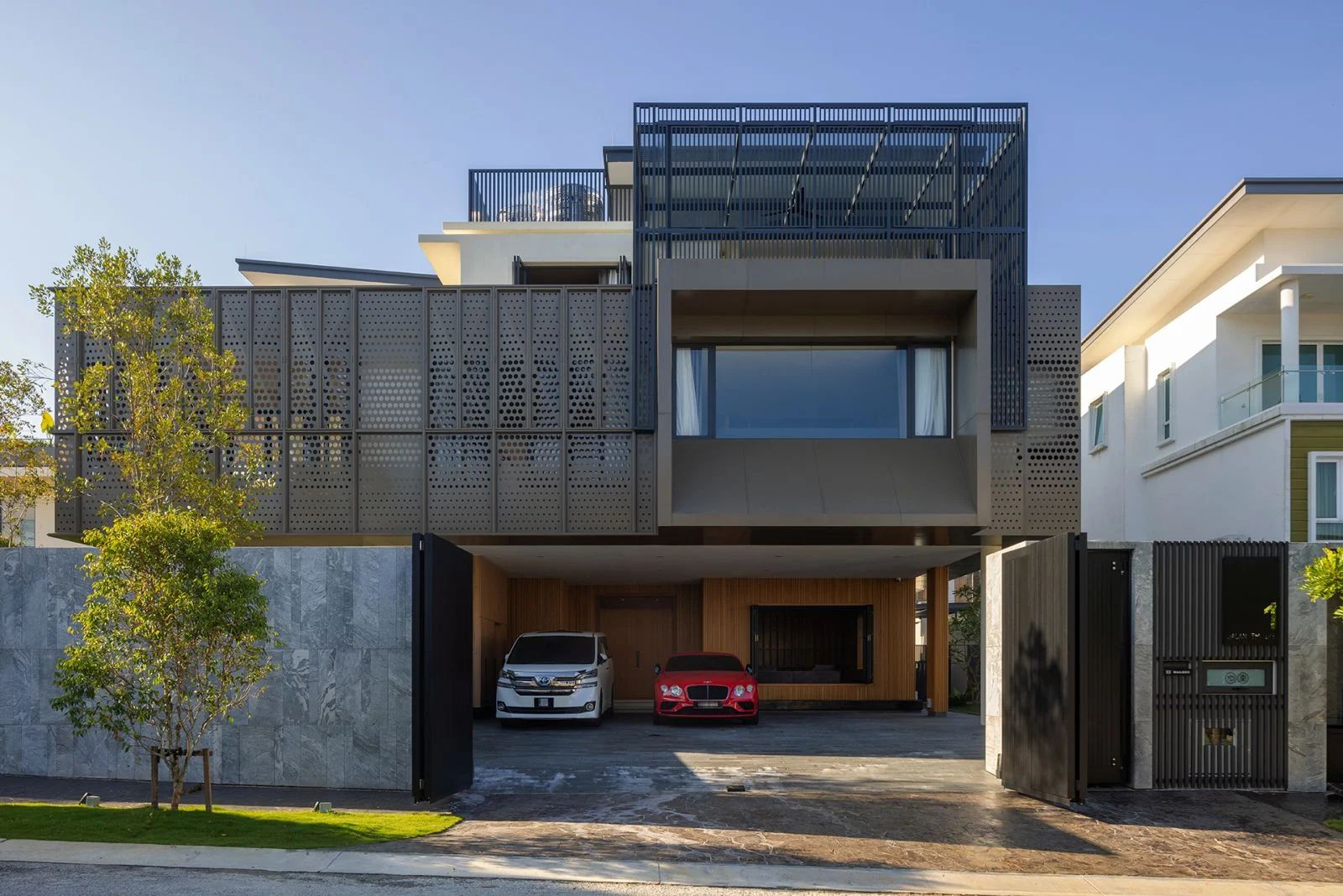Your cart is currently empty!
Living in a tropical climate comes with its own unique challenges, especially when it comes to managing indoor comfort and energy efficiency. High temperatures, high humidity, and unpredictable weather conditions can lead to increased energy consumption as homeowners try to keep their homes cool and comfortable. Fortunately, smart home technology offers practical solutions to help you optimize comfort, save energy, and adapt to the demands of a tropical environment. In this article, we explore the best smart home devices and solutions that can make living in a tropical climate more efficient and comfortable.
1. Smart Thermostats: Control the Heat with Precision
In a tropical climate, where temperatures can soar throughout the day, managing indoor temperatures efficiently is key to maintaining comfort while keeping energy costs in check. Smart thermostats offer a convenient way to control your air conditioning system and ensure your home stays cool without wasting energy.
- Automated Temperature Control: Smart thermostats like the Nest Thermostat or Ecobee allow you to set schedules that adjust your home’s temperature based on the time of day. For example, you can program the AC to turn off when you’re at work and start cooling your home just before you return.
- Learning Your Preferences: Many smart thermostats learn your daily routine and adjust the temperature accordingly. For instance, during the hottest part of the day, the thermostat can automatically cool the house to a comfortable level and save energy during cooler evenings.
- Remote Access: With remote access via smartphone apps, you can control your air conditioning system from anywhere, ensuring you never return to an overheated home.
In a tropical climate, the ability to automate cooling and avoid energy wastage is essential. Smart thermostats ensure your home remains comfortable while reducing unnecessary energy consumption.
2. Smart Fans and Air Circulators
Air conditioners aren’t the only solution for managing tropical heat. Smart fans and air circulators can complement your cooling system, helping to circulate air and maintain comfortable indoor temperatures without the high energy consumption of AC units.
- Smart Ceiling Fans: Brands like Haiku by Big Ass Fans offer smart ceiling fans that automatically adjust speed based on room temperature and humidity. You can control these fans through an app or voice assistants like Amazon Alexa or Google Assistant.
- Energy-Efficient Cooling: Smart fans use far less electricity than air conditioners and can create a cooling breeze, making the room feel cooler without needing to lower the thermostat. For instance, you can schedule a smart fan to run during the day and rely on air conditioning only at night.
- Climate Integration: Some smart fans integrate with weather apps, allowing them to adjust airflow based on outdoor conditions. On especially humid days, the fan can increase its speed to enhance comfort.
Using smart fans in combination with air conditioning can reduce cooling costs while maintaining comfort in hot, tropical environments.
3. Smart Blinds and Shades: Block Out the Sun
In tropical climates, direct sunlight can quickly heat up your home, causing your air conditioner to work harder. Smart blinds and shades provide a solution by blocking out heat during the hottest times of the day, reducing the load on your cooling system.
- Automated Control: Smart blinds, such as those from IKEA’s Fyrtur series or Lutron Serena, can be programmed to automatically close during peak sunlight hours. By doing this, you can prevent heat buildup and keep your home cooler.
- Sunlight Sensors: Some smart blinds come equipped with sunlight sensors that detect the intensity of sunlight and adjust the blinds accordingly. For example, if the sun is particularly strong in the afternoon, the blinds will automatically close to reduce solar heat gain.
- Remote Access: With smart blinds, you can control them remotely through a smartphone app. If you forget to close the blinds before leaving for work, you can do it from anywhere, ensuring your home stays cool throughout the day.
By automating the control of sunlight entering your home, smart blinds help maintain cooler indoor temperatures and reduce the reliance on air conditioning.
4. Smart Humidity Control: Manage Tropical Humidity
In addition to high temperatures, tropical climates often come with high humidity levels, which can make your home feel warmer and more uncomfortable. Smart humidity control devices, such as dehumidifiers and humidistats, can help you maintain a comfortable indoor environment by reducing excess moisture in the air.
- Smart Dehumidifiers: Devices like the Frigidaire Smart Dehumidifier or Midea Cube allow you to control humidity levels in your home through an app. These devices can automatically adjust based on current humidity readings, ensuring that your home remains dry and comfortable without constant manual adjustment.
- Integration with Air Conditioning: Some smart dehumidifiers work in tandem with your air conditioning system, ensuring that both temperature and humidity are balanced for optimal comfort. By reducing humidity, your air conditioner can cool more efficiently, leading to energy savings.
- Humidity Alerts: Smart humidity sensors can notify you when levels rise above a comfortable threshold, helping you take action before it becomes too uncomfortable. This is especially useful during monsoon seasons when humidity can spike suddenly.
By managing indoor humidity effectively, smart dehumidifiers and sensors help create a more pleasant living environment, even in the most humid tropical climates.
5. Smart Irrigation Systems: Keep Your Garden Green
For those with gardens or outdoor spaces, managing water usage in a tropical climate can be challenging. Smart irrigation systems make it easy to water your plants efficiently, ensuring that they get enough water during dry spells and reducing overwatering during rainy periods.
- Weather-Based Adjustments: Smart irrigation systems like Rachio or RainMachine use local weather data to adjust watering schedules automatically. If rain is in the forecast, the system will delay or skip watering, preventing water waste.
- Remote Control: You can control smart sprinklers remotely, allowing you to water your garden while you’re away from home. This is particularly useful in tropical regions, where the weather can change suddenly, and you may need to adjust your irrigation plan on the go.
- Water Conservation: Smart irrigation systems help conserve water by delivering just the right amount of moisture to your plants. This not only helps save on water bills but also ensures that your garden thrives, even during hot or dry periods.
By automating your garden’s irrigation, smart systems help you maintain a lush outdoor space without wasting water, making them an ideal solution for tropical climates.
6. Smart Air Purifiers: Breathe Easier in Humid Environments
Tropical climates can bring a range of allergens and air quality issues, especially during rainy seasons when mold and mildew can become more prevalent. Smart air purifiers help improve indoor air quality by filtering out pollutants, allergens, and moisture-related irritants.
- Real-Time Air Quality Monitoring: Smart air purifiers, like the Dyson Pure Cool or Levoit Smart Air Purifier, continuously monitor air quality and automatically adjust their purification levels based on current conditions. You can also track air quality data through an app to see how it changes throughout the day.
- Automatic Adjustments: These devices can automatically increase their filtration speed when they detect higher levels of humidity or pollutants, ensuring that your indoor air stays clean and comfortable even during periods of high moisture.
- Voice Control and Integration: Many smart air purifiers integrate with voice assistants like Alexa and Google Assistant, allowing you to control them with simple voice commands. For example, you can ask Alexa to increase the purifier’s speed if humidity levels are high.
By keeping your indoor air free from allergens and irritants, smart air purifiers make it easier to maintain a healthy, comfortable living environment in tropical regions.
7. Smart Energy Monitoring: Track and Optimize Energy Usage
In a tropical climate, energy consumption can skyrocket due to the constant need for cooling. Smart energy monitors help you track your energy usage in real-time, providing insights into which devices are consuming the most power and helping you optimize their usage to save money.
- Real-Time Energy Tracking: Smart energy monitors like Sense or Emporia connect to your home’s electrical panel and provide detailed data on how much energy each device is using. This allows you to identify high-energy appliances, such as air conditioners or fans, and adjust their usage accordingly.
- Energy Saving Suggestions: Some smart energy monitors provide actionable suggestions for reducing energy consumption. For example, they might recommend setting your thermostat a few degrees higher during peak heat hours to save on cooling costs.
- Integration with Smart Devices: Many energy monitors integrate with other smart devices, allowing you to automate energy-saving actions. For example, you could program your smart thermostat to adjust based on energy usage data, or set your smart plugs to turn off high-energy devices during certain times of the day.
By monitoring and optimizing your energy usage, smart energy monitors help you reduce electricity bills and minimize the environmental impact of keeping your home cool in a tropical climate.
Conclusion
Living in a tropical climate can present unique challenges, especially when it comes to staying comfortable and managing energy use. Smart home solutions offer a range of tools to help you optimize your indoor environment, reduce energy consumption, and improve overall comfort. From smart thermostats and fans to automated blinds and humidity control, these devices make it easier to manage the heat, humidity, and unpredictable weather that comes with tropical living. By integrating smart technology into your home, you can enjoy a cooler, more energy-efficient, and comfortable living space year-round.



Leave a Reply